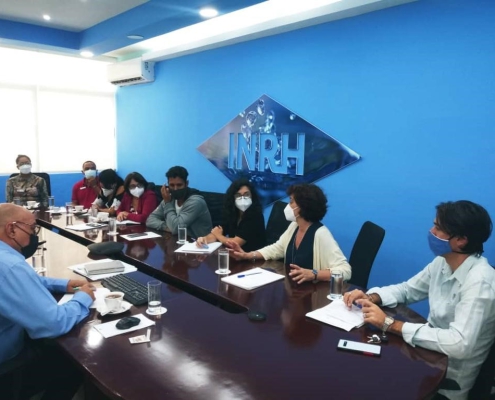Cooperations with Spanish organizations and companies
Governance support and large water and sanitation operations
Governance support and large water and sanitation operations

Spain gives special priority to technical cooperation in the field of water, sanitation and treatment, and shares its experience, knowledge and innovations in the sector, given our hydrological and climatological situation. Within the framework of the Fund, the technical cooperation of public institutions in the sector, which are internationally recognised and whose added value is widely acknowledged by our partners, has been intensified.
In this regard, in 2021, work continued with the public company Tragsatec to offer technical support for water and sanitation to the AECID Technical Cooperation Offices in more than 10 countries in Latin America and the Caribbean, as well as collaboration in knowledge management, institutional strengthening, hydrological planning and accountability. As an example of this collaboration, in December 2021, Tragsatec technicians participated in several meetings and planning sessions with the National Institute of Water Resources of Cuba (INRH).
In the area of sanitation and wastewater treatment, the Fund has worked in collaboration with the Hydrographic Studies Centre (CEDEX) to provide technical support to the programmes, particularly concerning sanitation and wastewater treatment. To this purpose, several guides on water and sanitation and recommendations for sectoral planning and regulations have been drafted (for further information see Section Partnerships/CEDEX). Work has also been carried out on various specific guides for the implementation of wastewater treatment systems in Bolivia, sanitation alternatives in the Bays of Havana and Santiago de Cuba, a training programme in Paraguay, and support for various actions in Panama.
This year also saw continued collaboration with the Spanish Geographic Mining Institute (IGME) in the framework of the Water Fund’s support to seek feasibility solutions for Guatemala City’s water supply, as part of one of the Fund’s programmes.
With regard to work with water and sanitation service operators, in 2020 a collaboration agreement was signed between the AECID and the public company EMASESA to promote activities to support and strengthen the operators with which it works. Within this framework, an initial twinning arrangement was made between EMASESA and the Honduran operator Aguas de la Sierra de Montecillos, which was reinforced in 2021 with the first trip by EMASESA technicians to the Caribbean country, a visit that the local operator’s technicians will later return to Spain. Likewise, in 2021, work began with the Portoviejo (Ecuador) operator, with EMASEA making a first trip there in November.
El apoyo a los operadores de agua es uno de los objetivos del Fondo de Cooperación para Agua y Saneamiento dentro de su apuesta general por el fortalecimiento institucional de los países con los que colabora. Con este objetivo, en el año 2020 tuvo lugar el acuerdo entre la Agencia Española de Cooperación Internacional para el Desarrollo, AECID, y EMASEA (Empresa Municipal de Abastecimiento y Saneamiento de Aguas de Sevilla, S.A.) para el intercambio de buenas prácticas y hermanamientos en materia de abastecimiento y saneamiento en países donde trabaja la Cooperación Española.
On the other hand, in February 2021, the AECID and the University of A Coruña (UDC) signed an agreement for the “Management, technical support and training in sustainable sanitation and drainage planning in the plurinational state of Bolivia”, with the aim of carrying out various activities within the framework of the LAIF programme “Support for the Water and Sanitation Programme in peri-urban areas of Bolivia”, and with funding from the same.
The main objective is to contribute to the development of sustainable urban water, sanitation and drainage plans in Bolivia. For this purpose, a series of technical supervision and training activities were carried out, mainly aimed at the Bolivian Ministry of Environment and Water (MMAYA), with the objective of ensuring that the country’s urban water cycle management strategy and policies include adequate stormwater management.
Specifically, the following activities were carried out: